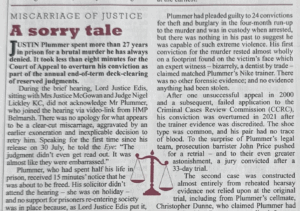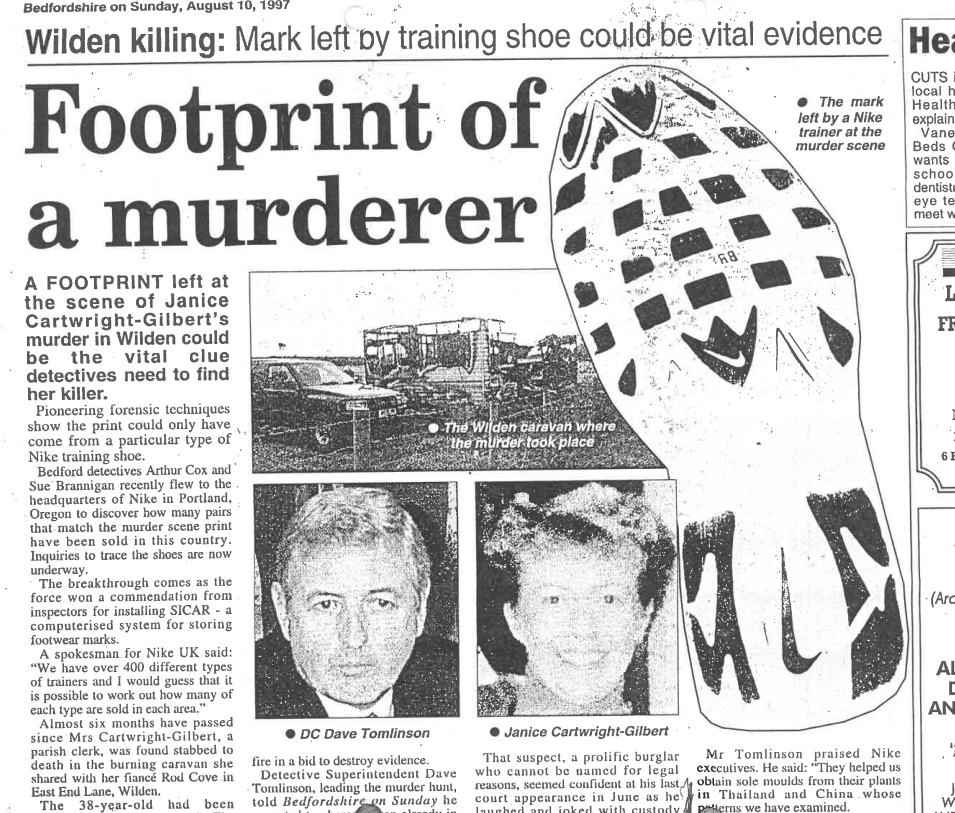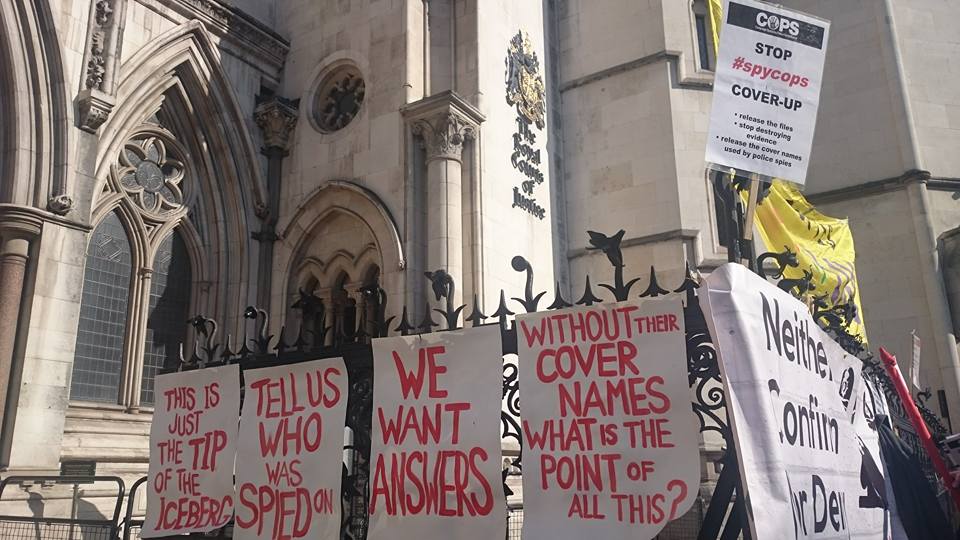Justin Plummer spent more than 27 years protesting his innocence in prison for a savage murder. On July 30, it took less than eight minutes for the Court of Appeal to overturn his conviction as part of its annual deck-clearing before end of the legal year ahead of the summer break.
Lord Justice Edis – sitting with Mrs Justice McGowan and Judge Nigel Lickley KC – did not acknowledge Plummer who joined the brief hearing via video-link from HMP Belmarsh. There was no apology for what appears to be a clear-cut miscarriage of justice aggravated by an earlier exoneration and an inexplicable decision to retry him.
‘That would have been the right thing to do but it didn’t happen,’ Plummer said. ‘The judgment didn’t even get read out. It was almost like they were embarrassed.’
- An earlier and shorter version of this article appeared in Private Eye
- You can read Jon Robins on the Justin Plummer case on Unherd and the Guardian
 Justin Plummer, who had spent more than half his life in prison, received 15 minutes’ notice that he was about to be a free man. His solicitor didn’t attend the hearing – she was holiday – and none of the support for prisoners re-entering society was in place because, as LJ Edis put it, circumstances were such that his release ‘could not be planned for’.
Justin Plummer, who had spent more than half his life in prison, received 15 minutes’ notice that he was about to be a free man. His solicitor didn’t attend the hearing – she was holiday – and none of the support for prisoners re-entering society was in place because, as LJ Edis put it, circumstances were such that his release ‘could not be planned for’.
He spent his first nights of freedom in a B&B arranged for by Citizens Advice miscarriage justice support service. He almost definitely will not be eligible for compensation due to a 2014 tightening of the rules introduced by the former conservative justice secretary, Chris Grayling.
For years, Justin Plummer has slept on the floor of cell to protest his innocence. His immediate response to being charged with the brutal murder of Janice Cartwright-Gilbert in 1997 was to flood his cell.
In February that year, the body of Janice Cartwright-Gilbert had been pulled out of a burning caravan near to the house she and her partner were renovating in rural Bedfordshire. The attack has been insane: she died from multiple stab wounds, she had been throttled by an electric flex and a knife and scissors were sticking out of her neck.
A prolific burglar, Plummer had been in custody when he was first questioned about the killing. Whilst he pleaded guilty to 24 convictions for theft and burglary in the four-month run-up to the murder, he denied any involvement with the killing. Over the years, he refused every opportunity for parole – he was 10 years over tariff when he had his conviction overturned last month.
Justin Plummer was convicted because the jury had been told that his Nike trainers were an exact match with a footprint on the dead woman’s face. There was no other forensic evidence; no evidence that anything had been stolen. There was also nothing in Plummer’s past to suggest he was capable of such an unhinged attack. Whilst he has a long criminal record, he had only a single conviction for violence – poking a police officer in the eye as he tried to run away.
There was an unsuccessful appeal in 2000 followed by a failed application to the Criminal Cases Review Commission (CCRC). Seventeen years later, a second application was made to the CCRC which led to the conviction being overturned in 2021 after the expert evidence matching his trainers to the footprint was completely discredited.
To the surprise of Mr Plummer’s legal team, the prosecution barrister John Price KC pushed for a re-trial – and to their even greater astonishment a jury convicted after a 33-day trial.
Mr Price had constructed a new case almost entirely out of reheated hearsay evidence not relied upon at the original trial. Generally, courts are reluctant to allow hearsay because it is inherently unreliable – that is doubly true when it comes from the mouth of a convicted criminal who is long dead.
This didn’t deter Mr Price otherwise known as ‘The Reverend’ for his evangelical determination to breathe life into hopeless cases. It had been accepted at the retrial that the footprint was not sufficiently clear as to indicate it was Plummer’s trainers; such shoes were common; and that forensic tests in 1997 and 2021, cutting deep into the fabric of his unwashed trainers, revealed no blood despite the prosecution claimed that had to wade through a bloody murder scene.
Instead, Mr Price managed to persuade the jury to believe the testimony of Mr Plummer’s cellmate, Christopher Dunne, who claimed that he had confessed to him.
It’s hard to conceive of a witness less impressive than Mr Dunne; a police informant with convictions for violence and dishonesty who had been diagnosed with schizophrenia. He was not called as a witness at the 1998 trial because he was ‘unreliable and not credible’ and inconveniently (or not) dropped dead the following year.
According to Mr Dunne’s account, he deliberately mentioned the name of his own police handler (DC Sue Branagan) in a conversation with Plummer in order to provoke a response from him – he claimed that Plummer immediately ‘went white’ and became agitated before confessing. However, as the Court of Appeal noted, Dunne could not possibly have known of Branagan’s involvement in the case at the time that Plummer was It was evidence that Lord Justice Edis ruled should not have been put before a jury – but he was careful to avoid criticising Mr Price: ‘Confession evidence of this kind is not unknown and experience suggests it sometimes fares quite well, and sometimes comes apart at the seams.’
The other evidence was largely a ragbag of yet more hearsay evidence dismissed by the Court of Appeal as ‘tenuous and weak’ including the even more unpersuasive testimony of three more prisoners (only one was allowed in as evidence and he recalled Plummer denying the murder).
That this was all known (and so had come apart at the seams) before the retrial even kicked off did not appear to trouble the Appeal judges; nor that a jury convicted on the strength of it.
The main non-hearsay related evidence was the prosecution claim that property had in fact gone missing from the murder scene not argued at trial – supporting the notion that it was a burglary and likely to have been committed by sticky-fingered Justin Plumber.
Of particular interest to the prosecution barrister John Price was the mystery disappearance of a large industrial sander – that was, until the eagle-eyed junior barrister on Plummer’s team chanced upon a photograph as the judge was giving his summing up. The ‘missing’ sander had been there all along.
Justin Plummer spent his first night of freedom in a hotel arranged for Citizens Advice – sleeping in a bed for the first time in many years. ‘It was strange, very nice. I even had a duvet,’ he said.
Plummer likens being free after decades behind bars to ‘being reborn’. ‘Everything’s new. I’m so used to be being kicked from pillar to post at any given time and I’ve got adapt to that situation. Now, I’ve been chucked to the next post. Twenty-seven years ago, I was just doing what I usually do and then I get nicked for a murder, I didn’t do. That’s how life can be.’
Plummer calls that the CPS’s reliance on the evidence of a dead police informant (‘a weirdo’) ‘scraping the barrel’. ‘Why didn’t they use him at the original trial? They were just kicking the apple tree… . They didn’t have a case against me. They knew it. But if they thought for a second like they could get away with it again, they would.’
He is the first to admit he was no angel – or as he puts it: ‘I’m not going to lie to you, I was a little fucking scum bag.’ He believes that he was framed by the police for an appalling murder deliberately letting a psychopath walk free. ‘I was doing that many burglaries, I reckon somewhere along the line I did a high-ranking copper’s house or a KC’s or just somebody who’s right up there and said to Bedfordshire Police get this sorted out because “he’s taking the piss”.’
‘Everybody in life matures at different points in their lives,’ he says. Some it takes them longer, and some do it straight away. It just took me a little bit longer to realize you can’t go around doing that to people, robbing them. I’m a 50-year-old guy. I’ve got lots of regrets in life.’
His plans now are ‘to live life and relax’. ‘I’m not going back to prison. I have said that many times in the past – but it’s a completely different ball game now.’
Support the Justice Gap, buy PROOF







